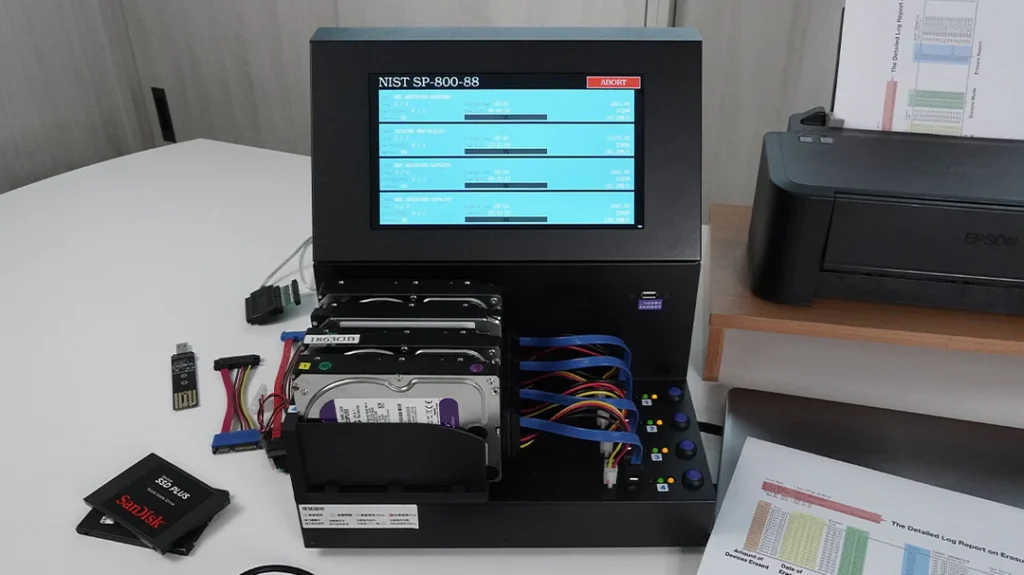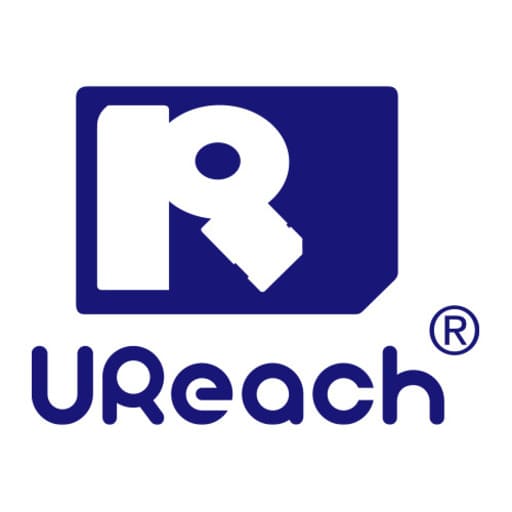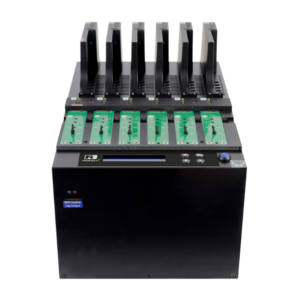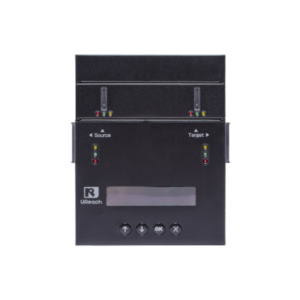
February 19, 2024
In today’s digital age, where personal and business data is constantly under the threat of hacking and breaches, safeguarding our valuable information has become more important than ever. One of the most effective ways to ensure the complete erasure of data from your hard drive is by using a reliable disk cleaner.
1.Importance of secure data wiping
2.What is a Disk Cleaner?
3.Benefits of using a Disk Cleaner
4.Factors to consider when choosing a Disk Cleaner
5.Top 5 hard Disk Cleaner
6.Features and capabilities of each Disk Cleaner
7.How to use a Disk Cleaner
8.Conclusion: Choosing the right Disk Cleaner for your needs
Importance of Secure Data Wiping
What is a Disk Cleaner?
A disk cleaner is a hardware tool designed to erase data from storage devices, such as hard drives, solid-state drives (SSDs), and USB flash drives. Unlike traditional deletion methods, which only remove file references and make data invisible to the operating system, a disk cleaner uses advanced algorithms to overwrite the entire storage space with random or predefined patterns. This method complies with the NIST 800-88 media erasure standard, ensuring that all existing data is irreversibly replaced, making it impossible to recover using data recovery techniques.
Disk cleaners are available in various forms, with different interfaces, port quantities, and erasing speeds. Some disk cleaners offer additional features, such as generating erasure certificates, skipping bad sectors, or performing asynchronous hot swap wiping. The choice of disk cleaner depends on your specific requirements, including the type of storage devices you need to wipe, the level of security you desire, and the ease of use.
Benefits of Using a Hardware Disk Cleaner
Using a hardware disk cleaner offers several key benefits compared to traditional wiping software:
Complete Data Erasure: Unlike simple file deletion or formatting, a disk cleaner ensures that all traces of data are permanently removed from the storage device. Compliance with the NIST 800-88 Purge & Clear Standard certified by Ontrack.
Protection Against Data Breaches: By securely wiping your personal and business data, you can protect yourself and your organization from potential data breaches. Disk cleaners are standalone devices, requiring no PC or internet connection, reducing the risk of virus infection.
Compliance with Regulations: Many industries, such as healthcare, finance, and government, have strict data protection regulations that require the secure disposal of sensitive information. By using a disk cleaner, you can ensure compliance with these regulations and avoid potential legal consequences.
Multiple Interfaces Supported: Disk cleaners support various interfaces, including M.2 NVMe, U.2 NVMe, M.2 SATA, SAS, SATA, mSATA, and CFAST.
Efficiency and Convenience: Disk cleaners offer high-speed and stable data wiping, even with full plug-in, and hot-swapping operations available. Each port can work independently.
Lower Time and Money Costs: Disk cleaners are a one-time investment with no recurring license fees, unlike software wipers.

Factors to Consider When Choosing a Disk Cleaner
When selecting a disk cleaner, it is important to consider several factors to ensure that it meets your specific requirements. These factors include:
- Security Level: Different disk cleaners offer varying levels of security. Some may use basic wiping algorithms, while others employ advanced methods approved by government agencies or international standards.
- Compatibility: Ensure that the disk cleaner you choose is compatible with the storage devices you need to wipe.
- User Interface: Look for a disk cleaner that offers a user-friendly interface, making it easy to navigate and use. Intuitive features, clear instructions, and a well-designed interface can significantly enhance the user experience and minimize the risk of errors.
- Additional Features: Consider any additional features or functionalities that may be important to you. Evaluate these features based on your specific needs.
By considering these factors, you can narrow down your options and choose a disk cleaner that best suits your needs. In the next section, we will introduce our selection of the top 5 disk cleaners, highlighting their features, capabilities, user reviews, pricing, and licensing options.
Top 5 Disk Cleaners
After extensive research and evaluation, we have curated a list of the top 5 disk cleaners that provide a combination of advanced data wiping algorithms, user-friendly interfaces, and reliable performance. These disk cleaners have been chosen based on their reputation, security features, ease of use, and overall customer satisfaction. Let’s take a closer look at each one:
- MGU12 SAS/SATA/M.2/U.2/USB3.0 Disk Cleaner
- MGE6 M.2 NVMe/SATA Disk Cleaner
- NS600D M.2 NVMe/SAS/SATA Disk Cleaner
- NUS02D M.2/U.2/SAS/SATA 2 Ports Disk Cleaner
- MEG4 High Speed SAS/SATA 4 Ports Disk Cleaner
In the next section, we will delve into the features and capabilities of each disk cleaner, providing you with the information you need to make an informed decision.
Features and Capabilities of Each Disk Cleaner
- MGU12 SAS/SATA/M.2/U.2/USB3.0 Disk Cleaner

- Supports SAS/SATA/M.2/U.2/USB3.0 SSD Wiping.
- Large touchscreen to display erasing progress and SMART info.
- Compliant with various international standards like NIST 800-88, DoD 5220.2-M, HMG Infosec.
- 30GB/min wiping speed.
- Supports Asynchronous Erase and allows configuring different erasure modes for each endpoint interface.
- Generates an erasure report automatically that complies with NIST, R2V3, and includes a log report.
- MGE6 M.2 NVMe/SATA Disk Cleaner

- Supports M.2 NVMe/SATA SSD Wiping.
- Large touchscreen to display erasing progress and SMART info.
- Compliant with various international standards like NIST 800-88, DoD 5220.2-M, HMG Infosec.
- 12GB/min wiping speed.
- Supports Asynchronous Erase by Independent Fast Key.
- Auto-recording Data Erasure Certificate & Log report.
- NS600D M.2 NVMe/SAS/SATA Disk Cleaner

- Supports M.2 NVMe, M.2 SATA, 2.5, 3.5 inch SAS SATA HDD and SSD Wiping.
- Compliant with various international standards like NIST 800-88, DoD 5220.2-M, HMG Infosec.
- 24GB/min wiping speed.
- Auto-recording Data Erasure Certificate & Log report.
- NUS02D M.2/U.2/SAS/SATA 2 Ports Disk Cleaner

- Supports M.2 NVMe, M.2 SATA, U.2 NVMe, 2.5, 3.5 inch SAS SATA HDD and SSD Wiping.
- Compliant with various international standards like NIST 800-88, DoD 5220.2-M, HMG Infosec.
- 24GB/min wiping speed.
- Auto-recording Data Erasure Certificate & Log report.
- MEG4 High Speed SAS/SATA 4 Ports Disk Cleaner

- Supports 2.5, 3.5 inch SAS SATA HDD and SSD Wiping.
- Large touchscreen to display erasing progress and SMART info.
- Compliant with various international standards like NIST 800-88, DoD 5220.2-M, HMG Infosec.
- 30GB/min wiping speed.
- Supports Asynchronous Erase by Independent Fast Key.
- Auto-recording Data Erasure Certificate & Log report.
How to Use a Disk Cleaner
Using a disk cleaner is a straightforward process, but it is important to follow the instructions provided by the manufacturer to ensure proper data erasure. While the specific steps may vary depending on the disk cleaner you choose, the general process typically involves the following:
Preparation: Ensure that you have a backup of any important data before starting the data-wiping process. Once the data is wiped, it cannot be recovered, so it is essential to have a backup in case you need any files in the future.
Connecting the Storage Device: Connect the storage device (e.g., hard drive, SSD, USB flash drive) to the disk cleaner using the appropriate interface. Ensure that the connection is secure.
Selecting the Wiping Algorithm: Choose the desired wiping algorithm based on your security requirements. Most disk cleaners offer multiple algorithms, ranging from basic to advanced options. Follow the manufacturer’s instructions to select the appropriate algorithm.
Initiating the Wiping Process: Start the wiping process by following the instructions provided by the disk cleaner. The device will begin overwriting the storage device with random or predefined patterns, ensuring the complete erasure of data. Monitor the progress on the disk cleaner’s display.
Generating the Erasure Certificate: Once the wiping process is complete, some disk cleaners generate an erasure certificate, which provides a record of the data erasure process. This certificate can be useful for compliance purposes and provides proof that the data has been securely erased.
By following these steps, you can effectively use a disk cleaner to ensure the complete and secure erasure of data from your storage devices.
Conclusion: Choosing the Right Disk Cleaner for Your Needs
In conclusion, selecting the right disk cleaner is crucial to ensure the complete and secure erasure of personal and business data. By considering factors such as security level, compatibility, user interface, and additional features, you can make an informed decision that meets your specific requirements.
We hope that our curated list of the top 5 disk cleaners has provided you with valuable insights and guidance. Whether you are looking for a high-speed solution, advanced wiping algorithms, or a user-friendly interface, these disk cleaners offer a range of options to suit your needs.
Remember, investing in a reliable disk cleaner is a small price to pay for the peace of mind and security it provides. Safeguard your personal and business data by choosing a disk cleaner that ensures the complete and irreversible erasure of information.
Secure your data, protect your privacy, and prevent potential data breaches by using one of the top 5 disk cleaners mentioned in this article. Take control of your data security today and enjoy the confidence that comes with knowing your sensitive information is permanently erased.

Check out our full series of Eraser: Eraser Full series
Check out our M.2 NVMe series of Eraser: M.2 NVMe series
UReach-Malaysia official website: https://ureach.com.my/
E-mail: info@ureach.com.my






